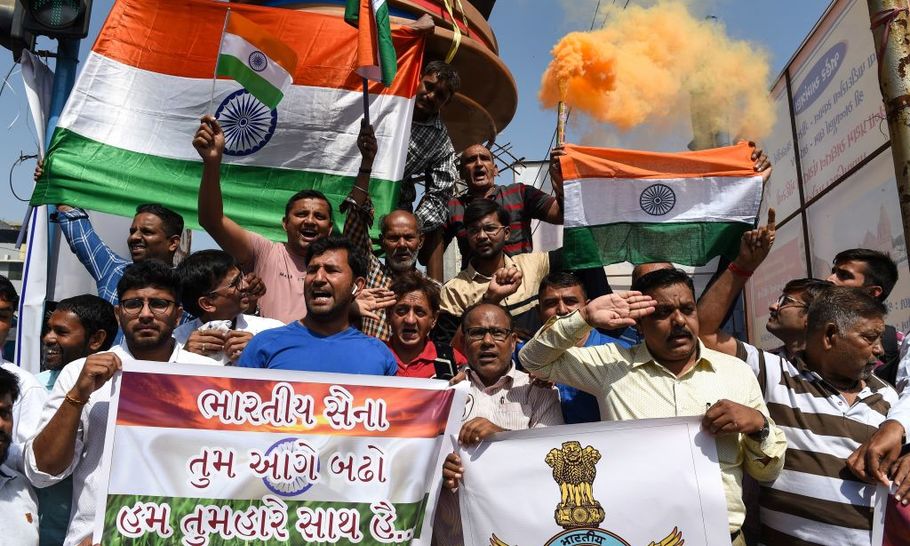This standoff between India and Pakistan could be the most dangerous so far

SAM PANTHAKY / AFP
India’s airstrike against Pakistan in the disputed province of Kashmir raises the spectre of war between the only Hindu and Muslim nuclear powers for the first time since 1971. During that half-century, the two nations have clashed repeatedly, usually in artillery exchanges across the border, but have avoided military incursions into one another’s territory. Now they are locked into an escalating crisis after an Islamist terrorist group killed 48 Indian soldiers last week, deliberately provoking last night’s reprisal.
One problem the rest of the world faces in assessing the gravity of this confrontation is the unreliability of both sides’ official bulletins. If India is to be believed, a “large number” of terrorists from the Jaish-e-Mohammed (JeM) group were “eliminated” in the airstrike, thanks to the “extreme valour” of the Indian Air Force. This was a “pre-emptive strike” to prevent further suicide bombings by JeM, according to the Indian foreign minister Vijay Gokale. The Hindu nationalist government of Narendra Modi insists that Pakistan is responsible for harbouring and training jihadis to attack India.
By contrast, the Pakistani government led by Imran Khan not only denies that it had anything to do with the JeM or other Islamist terrorism, but also claims that the Indian Mirage jets were driven off by a “timely and effective response from [the] Pakistan Air Force”. A military spokesman said the Indian aircraft dropped their bombs in an unpopulated area, causing no casualties. However, Pakistan’s cabinet is meeting in emergency session to consider how to respond to the crisis.
Why should the world care about a localised dispute that has rumbled on ever since most of Kashmir, a mainly Muslim region, was assigned to India in Lord Mountbatten’s hasty partition in 1947? The answer is that a full-scale conflict between India and Pakistan today, unlike 1971, carries the risk of nuclear war. Neither side would have anything to gain and a great deal to lose by war, but both countries are led by militaristic, nationalist and sectarian governments which are hypersensitive to prestige. Add to this a background of terrorism and subversion, and the fragile relationship between India and Pakistan can quickly become toxic.
Neither nation will find it easy to back down, but back down they must. Both Modi and Khan aspire to the status of global statesmen, but in other respects they could hardly be more different. The Indian prime minister is the first lower-caste leader of his country. Narendra Modi is an ascetic populist who came to power as a divisive anti-Muslim demagogue; but his generally even-handed conduct in office has brought him the respect of the West and confounded many of his critics. He faces a general election in April and May, which he is expected to win. But the imminence of the election may explain why India is risking a military standoff.
As captain of the Pakistan cricket team, Imran Khan was already a celebrity long before he became a politician. His reputation as a Westernised playboy did not help his political career and it took him decades to gain power in a country that has oscillated between military dictatorship and religious extremism. Having promised a clean break with the corrupt and intolerant politics of Pakistan’s past, Khan has faced international criticism over his handling of the Asia Bibi blasphemy case.
Now both prime ministers face a crucial test of leadership. Will they be brave enough to face down their own military hardliners, who are doubtless itching to deploy the expensive hardware they have purchased, mainly from the West?
A crucial role will be played by the ISI, Pakistan’s all-powerful intelligence agency. The ISI has often been accused of secretly protecting and funding Islamist terrorists and conducting proxy wars throughout the region, using organisations that include al-Qaeda and the Taliban; they were undoubtedly aware of the presence of Osama bin Laden in Abbotabad, a Pakistani military base. It is also believed to have helped found JeM, the Kashmiri jihadis responsible for the present crisis. Imran Khan is nominally in charge of ISI, but in practice the agency operates independently of the government and includes numerous Islamists in its senior ranks. If the prime minister relies on ISI advice, war becomes much more likely.
There have been three wars and several standoffs between India and Pakistan; this could be their most dangerous confrontation so far. Khan may feel obliged to retaliate or lose the support of his military and intelligence establishment as well as the religious leaders. If Khan gets it wrong, he knows that he could be overthrown, exiled or even assassinated, like some of his predecessors. Modi knows that his country is far richer, more populous and more powerful than Pakistan. He has a choice: to use that power to humiliate his opponent, thereby perpetuating the conflict and perhaps precipitating a coup in Pakistan, or to de-escalate, risking a loss of popularity just before a general election. The world is watching to see whether these two leaders deserve to be considered as global statesmen or regional warlords.





